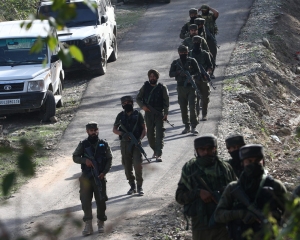Chief Minister and Gorakshapeethadhishwar Yogi Adityanath said that at a time when much of the world lacked a strong emphasis on civilisation, culture and human values, India was flourishing in all these areas.
“From ancient times to the present, Indian civilisation has been deeply rooted in democratic principles. The Rishi tradition emphasised the principle of ‘Live and Let Live’, a true form of democracy, one that originated in India,” he remarked.
“Unlike other cultures that sought to conquer or dominate, India’s ethos has always been one of inclusivity, captured in the timeless philosophy of ‘Sarve Bhavantu Sukhinah’ (May all be happy). This spirit is reflected today in Prime Minister Narendra Modi’s vision of Sabka Saath, Sabka Vikas,” he added.
Chief Minister Yogi made these remarks while presiding over the inaugural conference on ‘India as the Mother of Democracy’, which was part of a series of discussions on contemporary issues, held in observance of the 55th death anniversary of Yugpurush Brahmaleen Mahant Digvijaynath Ji Maharaj and the 10th death anniversary of Rashtrasant Brahmaleen Mahant Avedyanath Ji Maharaj on Sunday.
Welcoming Rajya Sabha Deputy Chairman Harivansh Narayan Singh who was the chief guest, Chief Minister Yogi said, “The evidence of democratic values can be found in India from the Vedic period through the Ramayana and Mahabharata eras. In Indian democracy, the people’s voice and interests have always been of utmost importance. Indian tradition has long upheld the belief that the king is responsible for the well-being of the people.”
He added, “During the Ramayana era, Lord Ram prioritised the people’s voice, and Lord Krishna oversaw governance through a council of elders. When internal strife broke out in Dwarka, leading to the demise of the council members, Lord Krishna remarked that the laws of the state apply equally to all citizens.”
Chief Minister Yogi expressed concern over the fact that a mindset of slavery still prevails among some people in the country, despite India’s deep democratic roots that date back to ancient times. He said, “India lost its freedom when it failed to safeguard its democratic heritage.”
He pointed out that in ancient India, councils representing the people had the authority to remove autocratic kings, underscoring that in a true democracy, the welfare of the people is paramount. He cited the Vaishali Republic as a prime example from ancient history, where the entire governance system was dedicated to the people's interests.
The chief minister said, “Today, all Indians should take pride in their democracy and the nation’s rapidly growing economy, which is built on democratic values." He stressed that the strength of India’s democracy lies in the protection of the Constitution.
“It is the collective responsibility of every citizen to safeguard the Constitution with sincerity and rise above divisions of caste, creed, religion and region,” Chief Minister Yogi added. He noted that by upholding the highest respect for the Constitution, India can ensure a stronger democracy.
Rajya Sabha Deputy Chairman Harivansh Narayan Singh stated that the principles of democracy have been shaped by India’s 5,000-year-old values. He highlighted that the true democracy today is deeply rooted in Indian traditions and values.
Singh said, “The essence of democracy lies in the freedom to express one’s views openly, a principle deeply rooted in thousands of years of Indian tradition. Indian democracy provides people with full freedom, along with the ability to correct its flaws.”
The Rajya Sabha deputy chairman remarked that those influenced by Western ideals have mistakenly viewed Indian democracy as an imported concept, largely because of the habit of looking to Greece for inspiration. He pointed out that when India gained independence, many foreign scholars doubted the survival of democracy in the country.
“However, today, India stands ready to prove them wrong, as next year marks the Amrit Year of the implementation of the Constitution,” he asserted.
Singh said, “India is now presenting itself to the world as the true mother of democracy, a topic that had not been widely discussed before but is now being highlighted, including at the G-20 summit.”
He praised Uttar Pradesh Chief Minister Yogi Adityanath for advancing significant discussions on Indian democracy through such events. Referring to Chief Minister Yogi as the embodiment of the Ram raj concept, Singh said: “Yogiji reflects the spirit of Ram raj, with his work exemplifying ancient Indian values of equal justice and security for all.”
The Rajya Sabha deputy chairman, while paying tribute to the revered memories of Brahmalin Mahant Digvijaynath and Brahmalin Mahant Avedyanath, remarked that remembering great figures from the past serves as an inspiration for the future.
Both Gorakshpeethadhishwars played a pivotal role in reviving national, social, and cultural consciousness, and their lives were devoted to upholding Indian values, he added.
The conference was also addressed by former executive president of Uttar Pradesh Hindi Sansthan, Lucknow, Prof Sadanand Gupta, Brahmachari Das Lal of Sawai, Agra and Swami Vishwesh Prapannacharya of Sugreev Kiladhish Ayodhya.
On this occasion, chief priest of Gorakhnath temple Yogi Kamalnath, Mahant Suresh Das from Ayodhya, Mahant Shivnath from Cuttack, Mahamandaleshwar Santosh Das alias Satua Baba from Kashi, Mithileshnath, Rammilan Das, Bhayanaknath from Karnataka, Kamalnath from Ahmedabad, Ravindradas and others were also present.























